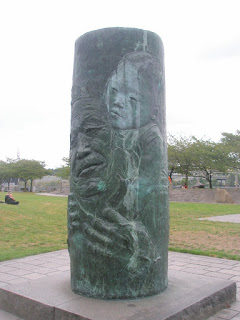Coming down off the mountain into the valley, both literally and figuratively, I found that the ideals of the tea ceremony don't always translate to life outside the garden.
Along the banks of the Willamette River is a memorial to the Japanese Americans who were kept in internment camps during World War II, a sort of too late apology for the injustices placed upon them.

There was a palpable irony in the park, though, as it was inhabited by twenty or so street people eating the meal provided by the Portland Rescue Mission. From the tall, thin man who muttered constantly through his remaining 3 teeth, to the couple entangled beneath a blanket, to the man who had managed to cram more stuff in his shopping cart than I have in my house, each one has a story. Each one has suffered and offered injustice.
I heard someone say recently that history is being treated as an open courtroom where we can constantly go back and apologize for past wrongs, as if that makes a difference. As if it's our responsiblity to atone for the sins of our forefathers.
Might I suggest that a better way to atone for the past is to make a better future?

3 comments:
I had never even heard of the Japanese American internment until a couple of years ago when we picked up a documentary at the library about it.
I agree with you about making the future better -- I still feel (unlogically) guilty for the sins of the past.
I don't know if this is God's way of saying, "you're wrong," or just a coincidence to ponder, but this morning's Bible reading included Luke 11:45-52. Read it and see what you think.
**I'm really having a struggle sorting out my feelings of this experience, Patty.
**As we arrived, I was trying to divorce the monument from the people cluttering it up while at the same time I was becoming deeply alarmed by a tragic level of inequity so evident in the heart of a major city.
**Many folk know of my passion to understand the WWII relocation and imprisonment of West Coast Japanese-Americans into dreadful internment camps [read: concentration camps] located in the most remote corners of the worst deserts of our western states.
**I was seeking out a place which heard was dedicated to the memory of that unjust internment in hopes that we never let it happen again. At the same time, I wanted to honor a local tribute devoted to the dignified way in which the Japanese internees conducted themselves as American citizens while enduring great distress at the hands of their own countrymen. Their only hope was that their children would be treated more fairly. Indeed, those stories are solidly there on the stones and plaques of the memorial.
**But as we stepped into the area in real time (I was not yet in an anticipated historical mood), all around appeared abundant visual evidence that another group of citizens has somehow been disenfranchised from attaining or enjoying the American dream. Whether by fiat or by choice, and I truly hope I'm not misjudging those who were present, a considerable number of the individuals who occupied the riverside parkway at that hour truly looked socially and financially disadvantaged. Like the Japanese who were incarcerated and forgotten in 1942, the individuals I saw Saturday seem to have also been displaced to an out of sight and out of mind location.
(BTW, I've explored downtown Portland for twenty-one years and only in the past month have I become aware that this spot and this particular monument on the west bank of the Willamette River even exists. It is between the Burnside and Steel bridges, and a convienient city parking structure stands just across Naito Parkway.)
** As much as I was glad to find the memorial, I suspect that what I am going to remember is an image of modern misery. It was a disturbing and most disquieting visit.
Post a Comment